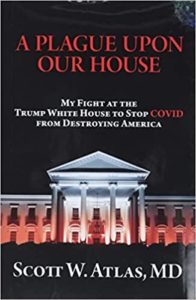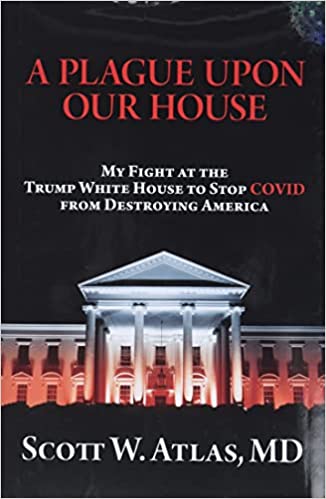
Was the SARS-CoV-2 coronavirus so dangerous to so many people that extreme government lockdowns were justified? Did the fatality rate from COVID differ substantially according to people’s age and presence of co-morbidities, and did governors and other policymakers systematically take account of those differences? Did it make sense to close schools to in-person attendance for anywhere from a few months to over a year? Was mask-wearing indoors, even by people who had no COVID symptoms, an important contributor to slowing the spread of the coronavirus? And what really went on at those meetings of the Trump White House’s Coronavirus Task Force? Specifically, were the members carefully reading the numerous studies that were being published in the United States and around the world and adjusting their advice accordingly? Did it make sense for governors and other policymakers to focus only on COVID and ignore the major costs — including the costs to health — from lockdowns?
Dr. Scott Atlas, a senior fellow at the Hoover Institution, addresses all of those questions and more in his book A Plague Upon Our House. (Full disclosure: I am also a Hoover fellow and know Atlas professionally.) But he does so much more than that. He lays out how dysfunctional both the task force and the White House were in dealing with the coronavirus. Based on my own experience at interagency meetings in Ronald Reagan’s administration, I find Atlas’s many reports of people on the task force “going with the flow” completely plausible. It’s true that we have to take his word for what went on, but based on my experiences with him at Hoover, I do.
Beyond making his case with many facts, Atlas is a passionate man, and his book reads as if it were written in anger and frustration. Some readers might find that off-putting. I like it because he almost never lets his passion override his respect for facts and reasoned argument. Indeed, his passion is largely based on his view that lockdowns led to many deaths, destroyed millions of livelihoods, and caused needless suffering — a case he makes well.
These are the opening paragraphs of David R. Henderson, “Atlas’s Case Against the Covid Lockdowns,” Regulation, Spring 2022.
Another excerpt:
Atlas’s other major policy disappointment was on schools. What was well known by the summer of 2020 was the harmful effects that school closings and remote learning were having on children, especially those in poorer families. Yet, notes Atlas, no one at the task force meetings, other than him, ever talked about the huge downsides of school closings. As noted above, the data showed clearly how safe young people were in school and, by the summer of 2020, how children rarely passed the virus on to adults. Therefore, argued Atlas at one of the meetings, schools should be opened without testing and masks. He writes that no one at the meeting, including Birx and Fauci, mentioned contrary data. Instead, Birx answered, “There is a bell curve of epidemiologists, and you are on the fringe.” Pence then asked Redfield, whose CDC was responsible for issuing guidance, what he thought about the risks of opening schools. Redfield replied, “Let’s just say, the jury is still out.”
Read the whole thing.


READER COMMENTS
Thomas Lee Hutcheson
Mar 26 2022 at 7:37am
But isn’t the real absurdity that a national committee would be considering what ought to be state and local policies at all? They should rather have been on CDC’s case to develop methods to translate local conditions into cost effective measures to reduce the spread and the FDA to allow the development of quick and dirty screening tests to make these local responses more effective.
This national level meddling set the stage for the subsequent politization of policy.
John Alcorn
Mar 26 2022 at 11:13am
Dr. Atlas’ memoir focusses, appropriately, on his first-hand interactions with the task force (career public-health officials and V.P. Pence).
Many other actors shaped restrictive pandemic policies (lockdowns, school closures, mask mandates, test mandates, etc.). Let me list some, in no particular order of importance:
a) New technologies:
—Zoom. (No Zoom = no remote work = no extended lockdowns.)
—Internet & mobile phone service firms. (No Netflix/Facetime etc = no virtual entertainment/interaction = no extended lockdowns.)
—Amazon. (No internet commerce/cheap delivery = no extended lockdowns.)
b) Other actors:
—Zero Covid lockdown countries (China/Australia/NZ etc = Putative benchmark.)
—Sectional interest groups; for example, teachers unions.
—Employers, who wanted guidance/cover for HR.
—Risk-averse, fearful parents. (Media supply of doomsday scenarios largely driven by reader/viewer demand.)
—President Trump, polarization during election year.
What Bryan Caplan calls ‘Gubernatorial dictatorships’ quickly emerged. There was a wide spectrum of pandemic policies, from very restrictive to very open, among the States. Relatively small differences in the balance of political parties at the State level produced qualitative differences in pandemic policies from State to State.
Questions arise: How consequential was the task force? Did other actors/causes, perhaps some of the ones listed above, have more bite in shaping pandemic policies? Did citizen preferences drive policy? Did special interest groups play an outsize role? And so on.
My intuitions are:
a) New technologies (Zoom/Netflix/Facetime/Amazon) and the example of zero-Covid countries were necessary conditions for extended restrictive policies.
b) Each of the other causes, which I listed above (including the task force), increased the probability of restrictive policies, but was neither necessary nor sufficient by itself.
steve
Mar 26 2022 at 11:16am
I can agree on some things but you cite many things that are concerning. I am sure that working in the large groups was frustrating. It always is especially if you dont have good leadership which sounds to be the case. I would also agree that our approach to schools could have been better.We were too cautious in some places.
That said he is flat out wrong on lots of issues but lets go back to kids. He says that we knew by summer of 2020 that kids rarely transmit to parents. This is actually pretty hard to study and there weren’t that many studies. At link is a study published in 2021 showing that people were still trying to settle the question and showing that infections among kids are higher than generally thought and that they are probably more infectious than some people think. There were reports of community infections increasing coincident with kids returning to in person school.
Atlas seems to me have had some built in biases and if an early study confirmed that bias it then became a truth. That’s bad medical practice. especially when you should know something is hard to study you should wait for confirmation. Also, it sounds like he thinks, at least as you describe it, that he was one of the few to figure out that the CFR of 3.4% was too high. That was actually the prevailing opinion among medical people.
Steve
https://journals.plos.org/ploscompbiol/article?id=10.1371/journal.pcbi.1008559
Todd K
Mar 27 2022 at 5:50pm
What was he flat wrong about? He was far more correct than the unfortunate team of Fauci, Birx and Redfield. Remember Redfield said that masks were more effective than vaccines and that the U.S. could eliminate Covid? Without new data, Fauci both flipped on the effectiveness of masks and on lockdowns which he said in February 2020 wouldn’t work. Fauci only seems to have considered the possibility that people might acquire immunity if they got Covid, 18 months into the pandemic.
steve
Mar 27 2022 at 9:46pm
Just to mention a few things, Atlas was wrong about masks, he didnt realize one of the reasons for testing was to stop spread (he opposed any testing of asymptomatic people with exposure) and he believed we would have herd immunity at some point between 20%-50% of people being infected.
Not a Redfield fan. He was nominated by Trump because the anti-abortion people liked him. He had no real experience in public health. Not as bad as the Arabian horse breeder but still the wrong person at the wrong time.
Steve
Todd K
Mar 28 2022 at 2:55am
The random controlled trials showed that masks have been ineffective just as Fauci, the CDC and the WHO stated in early 2020.
The estimates from herd immunity that were discussed by epidemiologists that I heard in early 2020 ranged from 30% to 70%. Fauci started at 60% to 70% then 75%, then 80% and eventually got to 90%. Fauci also said in November 2020 that he U.S. could reach herd immunity “reasonably quickly” in 2021 yet that hasn’t happened even in the highest vaccinated countries except posibly Sweden.
Mark Brophy
Mar 28 2022 at 12:16pm
You can’t reach herd immunity with “vaccines” because they don’t work. The countries where the most people are vaxed such as Israel, Britain, and South Korea are spreading the virus most. We can only reach herd immunity with natural infections.
Comments are closed.